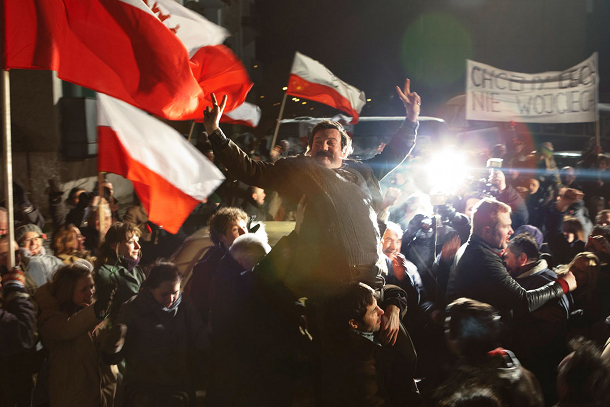Walesa: Man of Hope finds Andrzej Wajda, at the grand old age of 87, composing a triumphant conclusion to the trilogy of films that began under Communist rule with 1977's Man of Marble and continued with 1982's Man of Iron. That Wajda has no truck with the great man theory of history can be gleaned from the way his Lech Walesa, the bright spark of the Solidarity movement emerging out of the Gdansk shipyards, is introduced: getting flustered ahead of an interview with an Italian journalist in a poky flat overrun by six noisy kids. As incarnated by the cherishably hangdog Robert Wieckiewicz, Walesa soon puts on his game face, but he's never allowed to get too far ahead of himself. The interview instead provides the occasion for Wajda to cut back to his subject's activity over the 1970s, when his achievements were far less certain, the secret police were tailing him, and wife Danuta (Agnieszka Grochowska) was struggling to feed her brood. (In these scenes, Wajda uses all the resources available to him to show just how impoverished Poland was between 1970 and 1980 - and positions Walesa as the spirit necessary to put food on the table.)
Janusz Glowacki's script is fully aware of what might be considered character flaws, if not defects: this Walesa seems awfully fond of the sound of his own voice even before he's handed a loudhailer, and he's headstrong to a fault. He marches devil-may-care into the middle of a hunger strike to tell the participants what they're doing is crap before he even deigns to introduce himself; he hides illegal pamphlets in a pram, neglecting to remove his own son first, which leaves him holding the baby after he's arrested and thrown behind bars. (In one of the film's richest anecdotes of lower-case solidarity, a female police officer offers to breastfeed the mewling tyke.) "Do I sound cocky?," he asks the journo at one point, which chimes with the Walesa self-confident enough to tell his captors they'd never kill him, because they'd thereby transform a man into a martyr. Throughout, however, he is a vital presence: there's never any doubt his country needed his hand on the scruff of its neck to drag it into a new era.
Around him, Wajda makes the potentially dry business of collective bargaining appear an urgent and necessary endeavour for those 21st century audiences who roll their eyes at train strikes, then wonder why they don't have any money left in their pockets come the end of the month. Partly it's the fluid shooting style, Pawel Edelman's restless handheld camera capturing the tumult that inevitably followed whenever Walesa barrelled into a room - and the covert surveillance to which he was subjected. Partly, it's the playful editing, splicing Wajda's own footage into period newsreel, so that Wieckiewicz-as-Walesa seems to be going head-to-head with the greying movers and shakers. And partly it's the heterodox soundtrack, which skips chronologically through Polish punk, thrash metal and New Wave pop, building a musical history of dissent and resistance. Yet the bulk of the heavy lifting is done by Wieckiewicz, whose tremendous performance gets to the heart of something in this particular history: here is a Walesa who, in the face of ever more forceful attempts to undermine him, determined not to be cowed, swayed, trampled or otherwise overcome.
(January 2017)
Walesa: Man of Hope screens on BBC2 tonight at 1am.

No comments:
Post a Comment